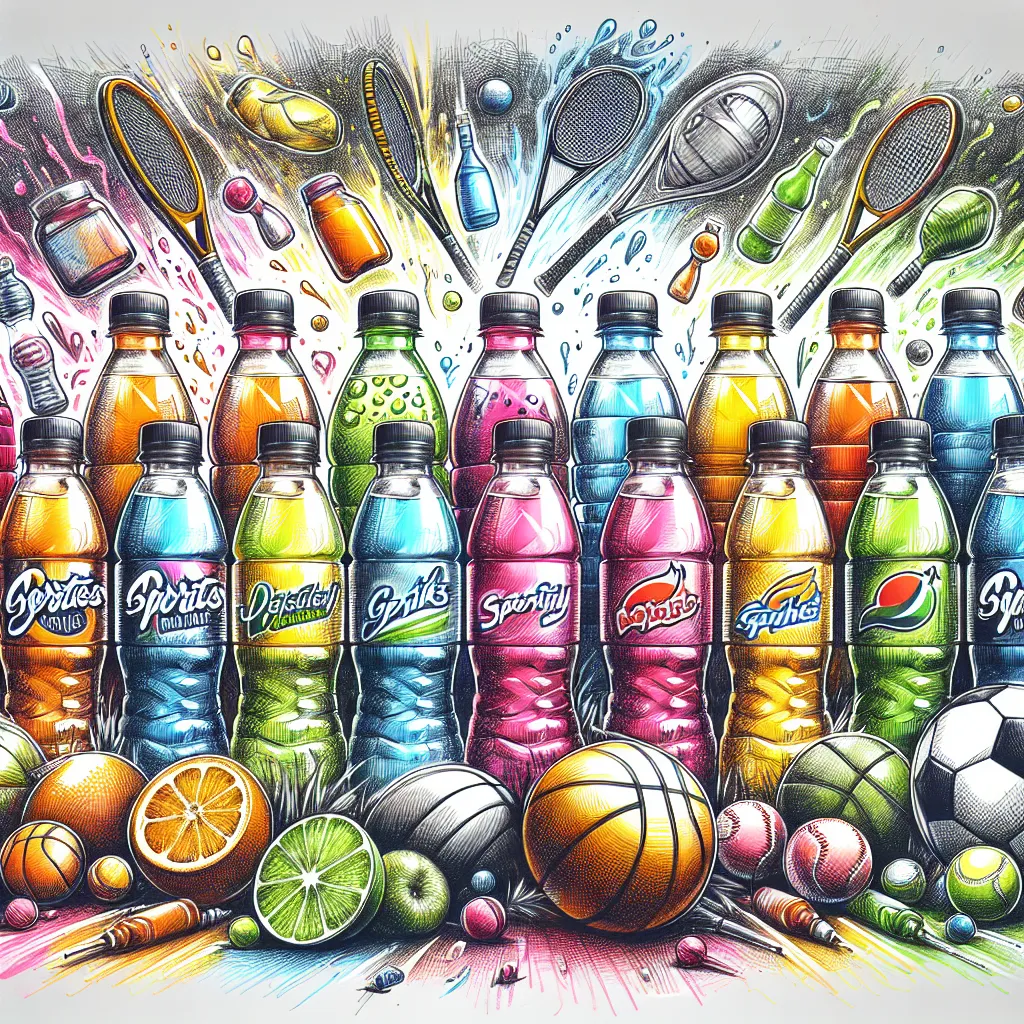Are you preparing for the IELTS exam and looking to enhance your vocabulary related to sports and nutrition? In this comprehensive guide, we’ll dive deep into the world of sports drinks, exploring their significance in athletic performance and how to effectively use this terminology in your IELTS exam. Let’s hydrate our minds with knowledge and quench our thirst for linguistic excellence!
What Are Sports Drinks?
Sports drinks, also known as electrolyte drinks or isotonic drinks, are beverages specifically designed to help athletes rehydrate and replenish electrolytes lost during intense physical activity.
- Part of Speech: Noun (plural)
- Pronunciation: /spɔːrts drɪŋks/

Context and Usage
Sports drinks are commonly used in various athletic scenarios. Let’s explore some examples:
-
During endurance events: “Sports drinks were handed out at every water station during the marathon to help runners maintain their electrolyte balance.”
Analysis: This sentence highlights the practical use of sports drinks in long-distance running events, emphasizing their role in maintaining electrolyte balance.
-
In team sports: “The coach insisted that the players consume sports drinks during halftime to prevent dehydration in the hot weather.”
Analysis: This example showcases the use of sports drinks in team sports, particularly in challenging weather conditions.
-
For post-workout recovery: “After an intense training session, athletes often reach for sports drinks to replenish lost fluids and electrolytes quickly.”
Analysis: This sentence illustrates the role of sports drinks in post-exercise recovery, emphasizing their efficiency in replenishing fluids and electrolytes.
-
In hot climates: “When exercising in tropical climates, many fitness enthusiasts prefer sports drinks over plain water to replace both water and minerals lost through sweat.”
Analysis: This example demonstrates the preference for sports drinks in hot environments, highlighting their advantage over plain water in replacing both fluids and minerals.
-
For adolescent athletes: “Pediatricians recommend diluted sports drinks for young athletes engaged in prolonged, vigorous physical activities.”
Analysis: This sentence addresses the use of sports drinks for younger athletes, noting the recommendation to dilute them for this age group.
Frequency in IELTS
The term “sports drinks” and related vocabulary are moderately common in IELTS exams, particularly in:
- Reading passages about health, nutrition, or sports science
- Listening sections featuring discussions on athletic performance or hydration
- Writing Task 2 essays on topics related to health, fitness, or the sports industry
- Speaking Part 3 discussions about exercise, health trends, or the business of sports
Vocabulary Analysis
Word Structure
“Sports drinks” is a compound noun consisting of two parts:
- “Sports” (noun used as an adjective)
- “Drinks” (plural noun)
Synonyms and Antonyms
Synonyms:
- Electrolyte beverages (/ɪˈlektrəlaɪt ˈbevərɪdʒɪz/) – noun: Drinks containing minerals that conduct electricity in the body.
- Isotonic drinks (/ˌaɪsəˈtɒnɪk drɪŋks/) – noun: Beverages with similar concentrations of solutes as in the human body.
- Energy drinks (/ˈenədʒi drɪŋks/) – noun: Beverages designed to boost energy, although these often contain caffeine and are not always suitable for sports.
Antonyms:
- Plain water (/pleɪn ˈwɔːtə/) – noun: Water without any additives or flavoring.
- Dehydrating beverages (/diːˈhaɪdreɪtɪŋ ˈbevərɪdʒɪz/) – noun: Drinks that can increase fluid loss, such as alcoholic or caffeinated beverages.
Memorization Techniques
Mind Mapping
Create a mind map with “Sports Drinks” at the center, branching out to related concepts:
- Ingredients (electrolytes, carbohydrates, water)
- Benefits (hydration, energy, recovery)
- Types (isotonic, hypotonic, hypertonic)
- Occasions for use (during exercise, post-workout, in hot weather)
- Brands (Gatorade, Powerade, Lucozade)
Storytelling Technique
Imagine a story: “Sam the Sprinter was struggling in the scorching sun (S). Thankfully, he grabbed a sports drink, gulping down the Delicious liquid. Rapidly, he felt re-energized, Instantly Noticing improved Kinetics in his stride. The Sprint finished with Sam securing success!”
This story uses the letters in “SPORTS DRINKS” to create memorable associations.
Practice Exercises
-
Sentence Formation: Create five sentences using “sports drinks” and related vocabulary in different contexts.
-
Paragraph Writing: Write a short paragraph about the advantages and potential drawbacks of sports drinks for athletes.
-
IELTS-style Task 2 Essay: “Some people believe that water is sufficient for hydration during exercise, while others argue that sports drinks are essential. Discuss both views and give your opinion.”
-
Speaking Practice: Prepare a 2-minute talk on the topic: “The role of proper hydration in athletic performance.”
-
Vocabulary Extension: Research and list five ingredients commonly found in sports drinks, explaining their functions in the body.
Conclusion
Mastering the vocabulary related to sports drinks not only enhances your IELTS performance but also deepens your understanding of sports nutrition. Remember to practice using these terms in various contexts, from casual conversations to academic discussions. By incorporating this specialized vocabulary into your language arsenal, you’ll be well-equipped to tackle any IELTS task that comes your way.
We encourage you to share your experiences with learning and using this vocabulary in the comments below. Have you encountered “sports drinks” or related terms in your IELTS preparation? How do you plan to incorporate this knowledge into your study routine? Your insights could be valuable to fellow learners!
For more information on sports hydration and electrolyte replacement, check out our related articles. Stay hydrated and keep learning!